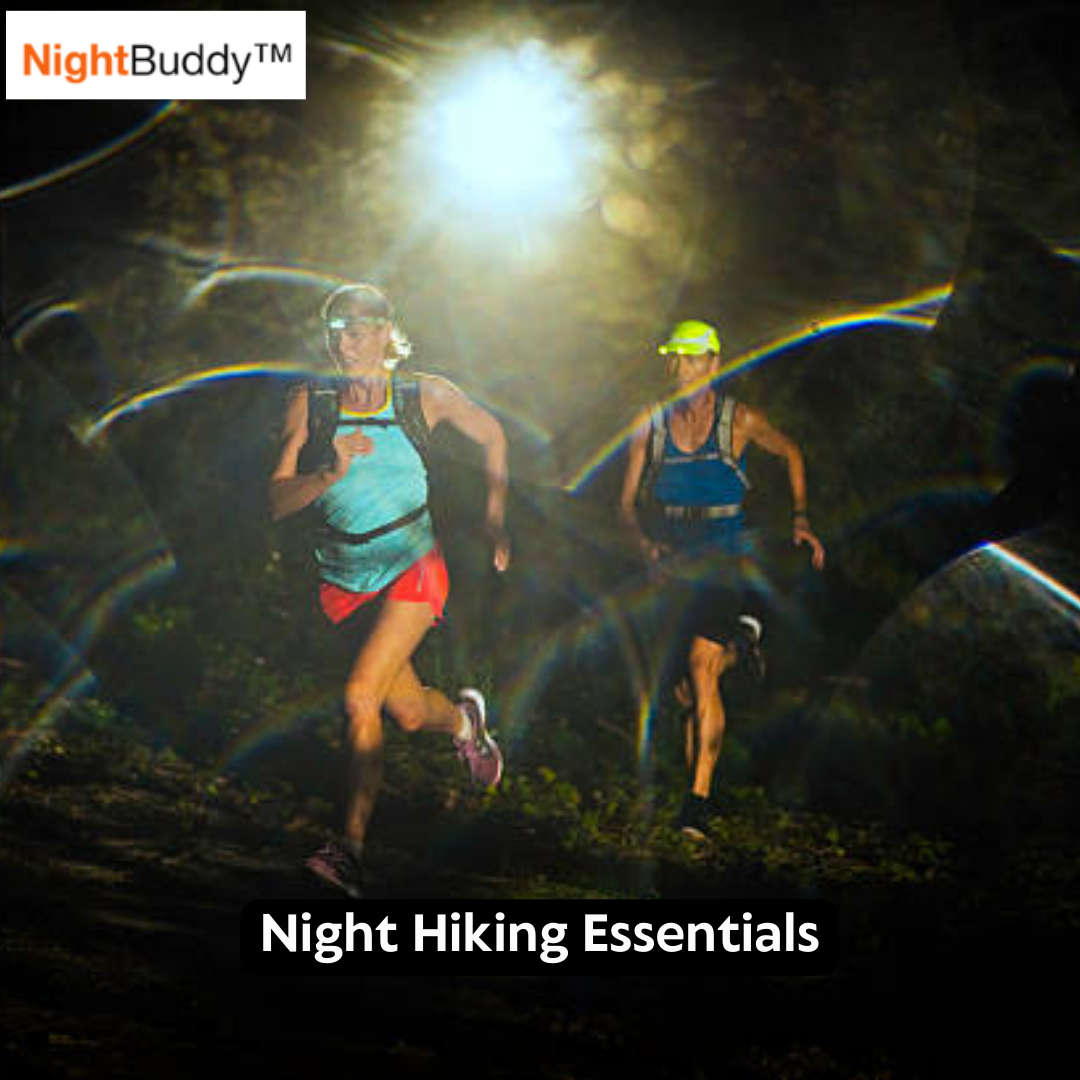You may need headlamps for camping, self-protection tools, eatables, hiking poles and boots, backpacks, sleeping bags, tents, etc., for overnight hikes.
If you are fond of night hiking, you surely love the beauty of trails at night.
The scenic views, quiet trails, and nocturnal wildlife help you enjoy the hike the most. Also, night hikes help you develop your low-light hiking skills. Plus, it's best for building concentration on technical trails.
So, to make your night hiking more enjoyable, safe, and confident, you must carry some essentials.
Keep reading to learn about the essentials for night hikes.
#1 Carry a Reliable Light Source

Overnight trips mean you need a smart and reliable source of light.
You have many options, like compact flashlights like a military-grade tactical flashlight, waist lamp, chest lamp, and headlamp.
But the most popular choice is headlamps. They help you hike, do camping, and do other outdoor activities with multiple brightness settings. Also, they have a good fit and battery life.
You don't always need bright lights for hiking. So, the alternative to flashlights, like headlamps, is a great option for natural night vision.
They have illumination control settings, different beams, rear lights, and a balanced design for night vision.
For example, the NightBuddy™ 230º LED headlamp is perfect for hiking. Also, stylish NightBuddy™ beanie lamps are also getting popular.
Remember to carry extra batteries and recharge them before the hike.
#2 Pack the Hikers Backpack with Right Gear
A hiking pack is one of the most essential for hiking list. Your backpack must be comfortable, spacious, and lightweight. So, avoid bulky items at all costs.
You can have 45-50L for normal hours of hiking. But, if you plan a multi-day hike, at least a 65L pack is best to carry all essential packing items.
It depends on your personal preferences.
Your backpack should accommodate all the things according to the duration and hiking location.
For example, it should be able to hold a tent, high-quality compass, sleeping bag, foam mattress, hiking pole, water bottle, batteries, camera, eatables, and extra items.
You can add hiking clothes like pants, rain jackets, a base layer, t-shirts, hiking shoes, socks, biodegradable toilet paper, emergency blanket, personal items, etc.
Remember to carry a backpack rain cover for extra protection.
If it's warm weather your backpack can be light. But, if it's cold additional layers may need extra space. Also, you should pack heavier items on the bottom and softer items on top.
#3 Remember to Carry Protection Tools
The rough terrain of the hike means you should be prepared for any situation. Some of the essential items you can consider for long-lasting protection:
First aid box: A first aid box having emergency medicines, bandages, sprays, etc., will help you if you meet a medical emergency situation.
Bear spray: A spray like bear spray or pepper spray is excellent protection if you encounter wildlife while camping in bear country.
Self-defence tools: Some defence tools, like keys, knives, bug spray, insect repellents for bloodsucking insects, etc., are helpful in any mishap.
Whistles or sound system: Carry whistles or a good sound system while hiking in bear country.
#4 Camping Gear
For your camping trip, you should carry camping essentials. You can only hike back the next day if you have good camping, food, and sleep.
So, carry a camping tent which is around 1 kg. It must be waterproof and lightweight.
Also, take a sleeping bag according to the temperature of the locations. Plus, sleeping mats, backpacking quilts, foam mattresses, extra layers, etc., are also good options.
Also, a camping light like NightBuddy rechargeable LED lantern or flood light buddy is good for overall illumination around the place.
#5 Pack Food and Snacks
You need sufficient calories during hiking. So, your food packing list must be according to the days and number of people.
You can carry burners with canisters, stove fuel, lightweight utensils, etc for food preparation and a hot meal.
The storage of food must be in airtight food jars so that you don't spill anything. Also, the quantity of fuel must be according to the days of the hike to have hot food.
Plus, some top food choices are ready-to-make edibles, dehydrated food, snacks, nutrition bars, peanut butter, hot chocolate, extra meals, etc.
Also, one important camp item is clean water. You should have a 4-6 liter capacity as you may have to stay days without water.
Please don't throw the non-biodegradable waste on the trails and bring them back for practising responsible hiking.
Precautions for Night Hiking

Here are some best practices for you:
- Share your trail and routes with family and friends.
- Study everything about the route and choose a familiar trail.
- If you are not confident, go with hikers groups, friends, or family.
- You should check the weather forecast before leaving for a hike.
- Download offline maps, carry maps, an expensive compass and activate safety apps on your mobile phone.
- Carry spare batteries for light and power banks.
- Add some fire ignition tools.
- Camp near access of water.
- Carry extra items like toilet paper, mid - layers, rain pants, duct tape, spare clothes, and water supplies for safe hiking.
- In cold conditions, windy conditions, bad weather, etc carry extra insulation.
- Camp near an emergency shelter for extra protection.
- Keep your phone safe at all costs, especially in mountainous regions and steep terrains.
So, you must follow this hiking packing list and essentials to have the best time. Hiking at night can welcome some surprises. To be safe and confident prepare yourself well for these exciting overnight trips.
FAQs
What are the benefits of night hiking?
Night hiking experience has many benefits there as less crowd, quietness, and the best temperature. Also, it helps to develop your skills as you need focus and technique on trail mix.
Is it OK to hike in the dark?
Yes, hiking in the dark is OK, but study the trails, wildlife, and locals. Also, read about advisories and regulations regarding the trails. Carry extra items for light, shelter, and food as hiking at night can be challenging.
How many lumens do you need for hiking at night?
You may need a source of light having 200 to 600 lumens for backpacking trips for the right night vision.
Read also;





Leave a comment
This site is protected by hCaptcha and the hCaptcha Privacy Policy and Terms of Service apply.